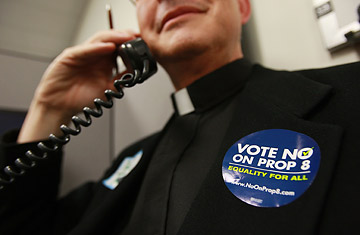
A pastor volunteers at a phone bank in conservative-leaning Orange County on Oct. 16 to urge Californians to vote no on Prop. 8, which would outlaw same-sex marriages in the state
(2 of 2)
Backers of a similar amendment that would forbid gay marriage in Florida appear to be ahead in the polls as well. That's left gay-rights supporters there pinning hopes on a new law that requires a supermajority of 60% to pass an amendment, thanks to a law pushed through by former governor Jeb Bush.
In Arizona, opponents of gay marriage are trying again, having lost no time fretting over the 48-52 loss in 2006. They've raised $7 million for a new ballot initiative — seven times what the losing effort raised two years ago, and 70 times what opponents have raised this year. The effort to forever define marriage as between one man and one woman has drawn the strong support of the Mormon Church as well as the Roman Catholic bishops in the state.
The ballot-box battles can be dispiriting for gays, who have otherwise grown used to hailing spectacular victories in the courts. Three state supreme courts — in Massachusetts, California and, just last week, Connecticut — have ruled that gays have the fundamental right to marry. Those courts have ruled that not even civil unions with all the legal trimmings of marriage can compensate. Gay-rights activists hope that Iowa's high court, will hear arguments in December and then rule as soon as January 2009 on a lower court's decision in favor of gay marriage, will bring judicial victories in state high courts to four.
Those kinds of victories are far more likely in the near term than any kind of wholesale reversal of fortune at the ballot boxes, says Kristina Wilfore, executive director of the Washington-based Ballot Initiative Strategy Center, an advocacy organization that specializes in using ballot initiatives to further liberal causes. Wilfore says her group picks its battles in fighting anti-gay-marriage amendments largely because most votes aren't even close. "We would never bring gay marriage up before the voters," she says. "This is [our opponents'] strategy." She admits they've been terribly good at it.
The Ballot Initiative Strategy Center, however, is fighting in Arizona in an attempt to protect gay marriage's sole Election Day success story. They've been involved in California too, though Wilfore says things there could go either way, in part because it's unclear what impact Senator Barack Obama's popularity in the state will have on the gay-marriage vote. Blacks and Hispanics, she says, are likely to vote with conservatives on gay marriage, but young people of all backgrounds tend to vote the other way. Which group will prove dominant is anyone's guess, she says, but it could determine the outcome of the Prop. 8 vote.
Meanwhile, with every court victory comes an electoral backlash. When a divided Connecticut Supreme Court ruled last week that gays have the right to marry, it took a far more cautious approach than California's Chief Justice Ronald George did in May. George issued a thundering declaration of gay rights, ruling that any law that discriminates on the basis of sexual orientation will from now on be met with the same strict scrutiny typically reserved for laws involving race or religion. By contrast, Connecticut's Justice Richard Palmer writes that "our conventional understanding of marriage must yield to a more contemporary appreciation of the rights entitled to constitutional protection."
A University of Connecticut poll out this week shows that most residents support the decision, but that hasn't stopped a furious last-minute campaign by opponents to get conservatives to the polls on Nov. 4. Every 20 years, voters in the Constitution State can choose to convene a constitutional convention, and as luck would have it, 2008 is one of those years. If supporters of a gay-marriage ban get enough votes, they'll be able to force a convention where they could push for changes that would nullify the ruling.
In Iowa, the supreme court hasn't even ruled yet, but already a similar voter push is underway. Conservatives are urging gay-marriage foes to not leave anything to chance: they're backing a group of judicial candidates that could utterly remake the majority on the high court.
Wilfore says she's prepared to take the long view in California. "I am not going to be discouraged if we lose," she says. Victory will come over time in the courts, as demographics works its influence on the nation's voting patterns, she says, noting that young people support gay marriage far more than their parents and grandparents do. "A lot of people are going to have to die" before Election Day is an easy day for gay marriage, she says.
But not everyone has such patience. San Francisco mayor Gavin Newsom, whose office has officiated over marriage ceremonies for thousands of gays since the California Supreme Court decision, told TIME recently that he thinks the outcome of the marriage vote will impact far more than just who can marry and who can't. "We're going to have a chance to find out whether America, and California, is ready for the change embodied in Barack Obama's campaign," said Newsom. "Or does it simply stop with him?" The country will know soon enough.
